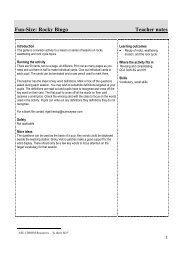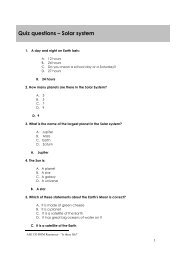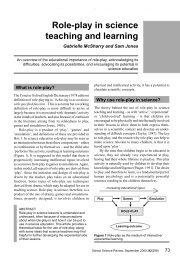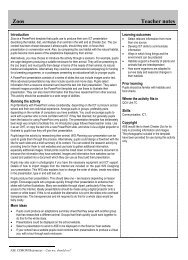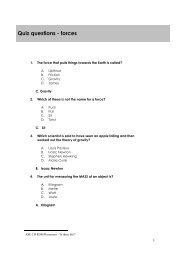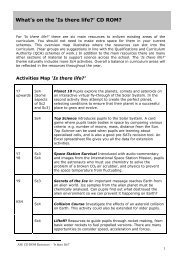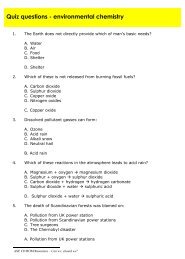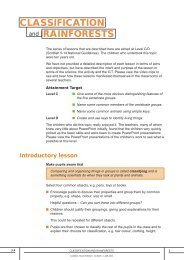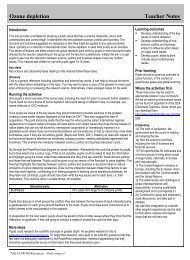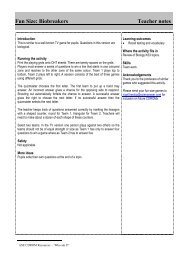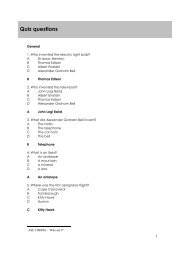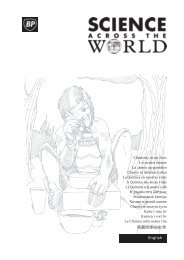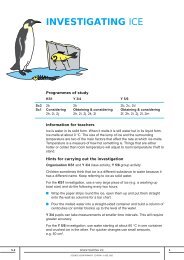Energy Resources Teacher Notes - National STEM Centre
Energy Resources Teacher Notes - National STEM Centre
Energy Resources Teacher Notes - National STEM Centre
Create successful ePaper yourself
Turn your PDF publications into a flip-book with our unique Google optimized e-Paper software.
What if? Consequence Mapping<br />
Further <strong>Teacher</strong> <strong>Notes</strong><br />
<br />
Introduction<br />
Non-renewable energy resources are being slowly exhausted; use of renewable energy resources is<br />
being encouraged. The Government has a target of 5% of electricity being generated from renewable<br />
fuels by 2003 and 10% by 2010. In 1999, 3% of electricity was generated from renewable fuels.<br />
This activity shows how consequence mapping can be used for an identified ‘What if…’ question. Part of<br />
the learning success is choosing an appropriate ‘What if …’ question – i.e. one which:<br />
In a citizenship context, has a values dimension and opportunity for considering impact on people,<br />
animals, wildlife etc.<br />
In a science context, has a basis in using some scientific knowledge, processes or practices –<br />
recognises the scientific evidence, and its limitations, underpinning the issue.<br />
Is realistic to the pupils – is a possible not hypothetical scenario.<br />
And where information is not too complex, further research can be undertaken in following up issues<br />
raised, if time allows.<br />
Running the activities<br />
a) Identify a ‘What if?’ question e.g. What if we had to recycle all the waste produced in school so that it<br />
can be burnt to heat the school?<br />
b) Ask pupils in small groups to produce a consequence map and highlight:<br />
Positive consequences, negative consequences – show which are certain, and which are uncertain.<br />
Values used.<br />
Where scientific evidence is used (e.g. burning waste may cause air pollution).<br />
One advantage of consequence mapping is that it encourages pupils to think beyond immediate local<br />
impact to consider wider issues of national and global responsibility.<br />
c) Using this map, each group of pupils considers whether they support the issue, they do not support the<br />
issue, they are uncertain. In doing this they note:<br />
Any scientific evidence they have used and its limits.<br />
The judgements they have made.<br />
The values they have used in this reasoning.<br />
d) Display the consequence maps along with the pupils’ reasoning around the room.<br />
These may show that what are seen as positive consequences by one group are seen as negative by<br />
others. The differing values can be identified and listed on the board. Pupils can be asked to indicate what<br />
they consider the most important values might be in energy consumption and conservation. They can also<br />
identify any values missing from the maps.<br />
e) In the plenary discussion, you can identify with the pupils the range of value judgements that have<br />
been made, and what the consequences of these are for a sustainable school energy policy. You can<br />
have a summary discussion on how the dominant values used might influence actions and behaviour i.e.<br />
what is the difference between saying we’ll be energy efficient (valuing energy resources) and actually<br />
reducing energy consumption (putting values into action)? What would be needed to put an energy<br />
efficiency policy into action by everyone?<br />
Learning outcomes<br />
Pupils identify the differing values<br />
which can impinge on discussion of<br />
an environmental issue<br />
Pupils are able to distinguish<br />
between ethical decisions (based<br />
on values) and scientific decisions<br />
(based on scientific evidence).<br />
Prior learning<br />
Pupils should have some familiarity<br />
with renewable and non-renewable<br />
energy resources.<br />
Where the activities fit in<br />
These resources may be used at<br />
appropriate places in your curriculum.<br />
The following suggestions are based<br />
upon the QCA schemes of work. Advice<br />
on teaching controversial issues can be<br />
found in appendix 9 of the QCA Key<br />
Stage 3 Citizenship <strong>Teacher</strong>s’ Guide,<br />
which you can download from:<br />
www.standards.dfes.gov.uk/schemes<br />
Citizenship<br />
1g) The importance of resolving conflict<br />
fairly<br />
2b) Justify orally and in writing a<br />
personal opinion about issues,<br />
problems or events<br />
2c) Contribute to group and exploratory<br />
class discussions<br />
3a) Use their imagination to consider<br />
other people's experiences and be able<br />
to think about, express and explain<br />
views that are not their own<br />
3b) Negotiate, decide and take part<br />
responsibly in both school and<br />
community-based activities<br />
f) Pupils can be asked to indicate what they have learnt about:<br />
How scientific evidence helps a scientific decision e.g. efficiency of waste combustion.<br />
Their own values and value judgements.<br />
The impact of differing values on collective action.<br />
How a collective energy policy should be decided.<br />
ASE CD ROM <strong>Resources</strong> – Can we; should we?



